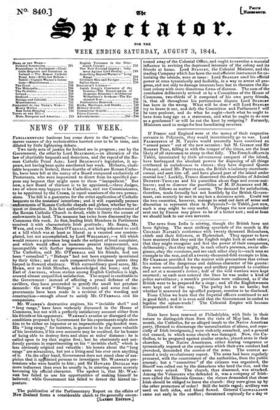NEWS OF THE WEEK.
PARLIAMENTARY business has come down to the " grouts,"—im- manse masses of dry technicalities hurried over to be in time, and diluted by little lightening debate.
Two tardy acts of justice for Ireland are in progress ; one by the Government, the other by Lord BEAUMONT,— an alteration of the law of charitable bequests and donations, and the repeal of the Ro- man Catholic Penal Acts; Lord BEAUMONT'S legislation, it ap- pears, not having been quite smothered last week. Hitherto, chari- table bequests in Ireland, three-fourths of which are Roman Catho- lic, have been left at the mercy of a Board composed exclusively of Protestants, who were impowered to divert from its specified pur- pose any bequest that might seem to them "inexpedient." But now, a new Board of thirteen is to be appointed,—three Judges, two of whom may happen to be Catholics, and ten Commissioners, to be appointed by the Crown, in equal numbers of the two persua- sions. The bill is a guarantee for the strict application of Catholic bequests to the testators' intentions; and it will especially protect 'endowments of Roman Catholic chapels and glebes, whether by be- quest or donation. It in fact authorizes the voluntary endowment of the Roman catholic Church in detail, while it limits the extent of endowments in land. The measure has twice been discussed by the Commons this week. At first, leading Irish Members in Parliament received it with characteristic Irish gratitude ; Mr. SHELL, Mr. WYSE, and even Mr. MORE O'FERRALL, not being ashamed to cavil at a bill which was at least as liberal as a vaunted one contem- plated, but not accomplished, by Lord WELLESLEY, —a bill which would remove a grievance long made the subject of loud complaint, and which would effect an immense present improvement, not incompatible with further improvements, but facilitating them. The Catholics, said Mr. O'FERRALL and his friends, had not been "consulted"; "Bishops" had not been expressly mentioned by their titles ; and on such comparatively frivolous points they harped in froward obstinacy. With extraordinary good sense, Mr. Hums, erst an Irish Member, acknowledged the boon ; and the Earl of ARUNDEL, whose station among English Catholics is high, avowed almost unqualified satisfaction. The sequel is creditable to the Government : instead of affecting a proud defiance of the -cavillers, they have proceeded to gratify the small but petulant demands : the word " Bishops " is inserted; and some real im- provements have been made in a revision of the wording and construction—enough almost to satisfy Mr. O'FERRALL and his companions.
Mr. WARNER'S destructive engines, his " invisible shell" and 4' long range," have been verbosely discussed in the House of Commons, but not with a perfectly satisfactory account either from . his friends or his opponents. WARNER'S evasion or disregard of the ' conditions proposed by Government for his experiments might show him to be either an impostor or an impracticable pig-headed man. His " long range," for instance, is guessed to be the more valuable of his inventions, if his own accounts may be credited, for he boasts of being able to destroy forts and ships at miles' distance : he is called upon to try that engine first ; but he obstinately and uni- formly persists in experimenting on his " invisible shell," which is less obviously original and valuable : his boasts about the "long range" are miraculous, but not a living soul has ever seen anything of it. On the other hand, Government does not stand clear of sus- picion that it apithinted persons to investigate Mr. WARNER'S pre- tensions who were hostile to him; and Sir HOWARD DOUGLAS was more indiscreet than even he usually is, in uttering sneers scarcely becoming his official character. The upshot is, that Mr. WAR- -NEE has failed to use his opportunities of making himself be believed; while Government has failed to detect the hinted im- posture.


























